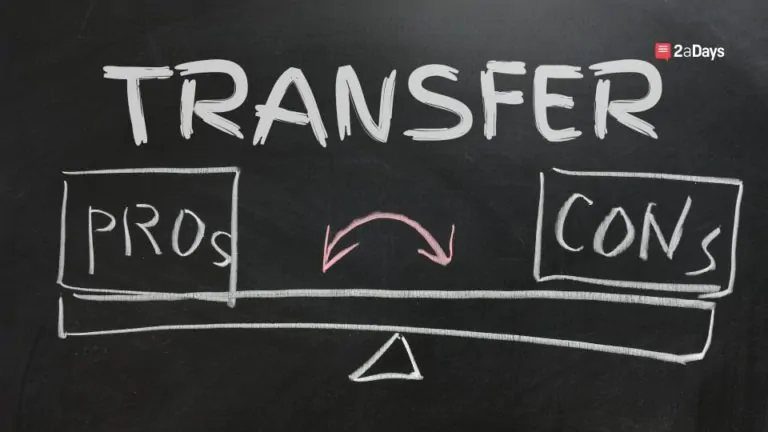When it comes to the process of deciding on whether or not to transfer to another school and team as a college athlete, it might not always be easy deciding on the right decision for you. Many students experiencing their first, second, or even third year at a NCAA athletic program are surprised to learn that it is not at all what they expected it to be. The decision to transfer poses both a blessing and a curse to college athletes, as there are benefits and challenges throughout the transition. In this article we will highlight three pros and three cons of transferring in hopes to make the decision a little more clear for student-athletes who are struggling to make a final decision.
Related: Rate your Coaches, Facilities, and Campus Visits
While evaluating this list it is important to remember that factors such as the sport you play, the conference you are in, the time of year, and more can all affect how the transfer process works for you. Everybody's situation is different, but taking a step back and looking at three main reasons why athletes choose to or choose not to transfer is a solid way to gauge and determine what the next steps could be for you. To start off we will highlight three cons that might outweigh the benefits you see in transferring to another team.
Con: Leaving Your Teammates
Entering the world of college as a freshman straight out of high school and being expected to make new friends is a scary place to be. Fortunately, athletes tend to have a helping hand when it comes to making friends, by already having a team full of companions, as well as a whole athletic department full of various sports teams with students that are their own community. Having to build brand new relationships with both teammates and a coaching staff after you transfer may be very difficult after building bonds and connections with individuals as an underclassman. Depending on personality, transfers can struggle to form connections in new environments and may wish that they had stayed with their original teammates after meeting the new ones.
Related: Lonely? 3 Tips to Help Busy College Athletes Make Friends
Con: Scholarship & Eligibility Rules
When entering the transfer portal, it is not always guaranteed that you will receive the same scholarship amount (or any scholarship at all) as your previous deal. To add onto that, the mess of whether or not you will have to sit out for a season may also come into play depending on the rules of the conference you are transferring from and into. Doing more research on both schools' policies will ensure that you are following the guidelines set in place by the NCAA, but the situation may still be stressful and complicated when it comes to learning and meeting all the requirements.
Con: You're Transferring…But Will Your Academic Credits Transfer, Too?
At the end of the day, being a student comes before being an athlete–even if it is often forgotten in the athletic community. If you are looking to transfer and the school that is recruiting you does not have any programs related to your field of study, you may find yourself in a tricky situation. Furthermore, depending on what year you are in and where you are looking to transfer, your credits may not shift over as easily as you'd hoped. If you have no other options you might end up choosing to put your athletics over your academics, which is something that should never have to happen to a college athlete.
Now that we have looked at some negative aspects of the transfer process, we can dive into a few of the great opportunities transferring can provide college athletes.
Pro: Mental Health Perks
When the coach or team at the initial school you chose is not compatible with you as a person, transferring is often a good opportunity to start somewhere new and fresh. Many times, coaches may act differently after the recruiting process and can often not be what you were expecting. Being in season and in person can be totally different, and you may learn that the coaching style you were promised is not what you are experiencing. Also, if you are not clicking with the team and have not been able to feel like you belong, you may find that other divisions or programs might be better for you. It is common to be unhappy in a situation where you are not enjoying the campus as much as you would've hoped after arriving and living there for a longer period of time. The transfer process allows you to learn from what you have experienced and search for a new situation that allows you to be happier and healthier, after knowing exactly what you want.
Related: Mental Health Matters: 5 Quotes to Inspire College Athletes
Pro: It's A New Experience
Looking at transferring in a positive light, a great benefit is realizing that you will get to experience a new place and make new connections. If you are unhappy at your current school, realizing that you can find something else and have a second chance at the experience you'd hoped for is an amazing feeling! Being an athlete in a different program is exciting in the sense that you will hopefully form another set of friendships and relationships with staff members who may be able to help you in the future. Networking and developing bonds with even more people is an amazing opportunity and can open your eyes to new possibilities for your future! Not everyone can say they played for multiple athletic programs!
Pro: More Playing Time
Depending on what type of athlete you are and what goals you are trying to accomplish in your sport, the issue of not receiving enough playing time or minutes can push the idea of transferring to the front of your brain. Getting more time to perform and learn new lessons in your sport may be a great reason for transferring. If you are hoping to go pro and need that extra play time to be recruited at a higher level, transferring may be a great option if you're unhappy in your current situation.
All in all, the decision to transfer or not to transfer can affect the trajectory of your college experience in a huge way. It's important to remember that what you want to do matters most and you should choose what will make you the happiest. You only get one chance to play as a college athlete, so make the decision that you'll be able to live with and that'll provide you with the best opportunities you are looking for. Have no regrets and focus on what will benefit you most in the long run!
Have an idea for a story or a question you need answered? Want to set up an interview with us? Email us at [email protected]
* Originally published on September 23, 2022, by Sarah Borer







